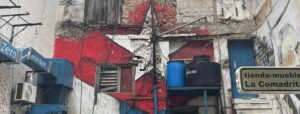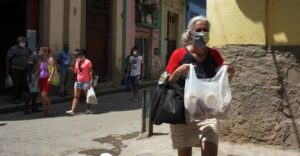In the context of the Pope’s upcoming trip to Cuba, and with the hope of dispelling commonly held misconceptions, WOLA has prepared what we hope will be useful background information on the history and current state of religion in Cuba. This is the third installment in a three-part series and explains how the Catholic Church and other faith groups are thriving and expanding their influence in Cuba, despite ongoing restrictions. The first installment looks at the diversity and richness of Cuba’s faith communities and the second details the ways that church-state relations have evolved since the Cuban Revolution. This series has been prepared by WOLA’s Program Director Geoff Thale, who has studied religion in Cuba extensively.
Despite a marked improvement in church-state relations in recent decades, restrictions on religious practice in Cuba continue to exist. But many of them are simply functions of the wider restrictions in Cuban society rather than being directed specifically at the churches. For example, churches must register with the state, which can be a difficult process full of bureaucratic obstacles. And unregistered churches can be subject to legal action. Moreover, the construction of religious buildings (as with construction of almost any private building) requires a permit, but such permits are rarely issued, although a new Catholic seminary was recently approved and constructed. New church communities can find it especially difficult to obtain space to meet and are thus often forced to meet in private homes; these “house churches” usually function without legal approval and can be subject to harassment by local authorities, particularly if neighbors complain. Like other organizations in Cuba, churches need government permission to publish private magazines or newsletters, and since all radio and television stations are state-owned, churches need government approval to air religious programming. Furthermore, because the state runs social service programs, church-sponsored programs are generally required to coordinate with local public services.
In practice, however, most religious groups have been able to function within the government’s limitations. According to the most recent report on religious freedom by the U.S. State Department, the government tends to tolerate most house churches, despite their lack of legal status. Meanwhile, the Catholic Church and several Protestant denominations have been publishing regular newspapers and magazines; Catholic Cardinal Jaime Ortega even has a weekly television program in Cuba. And religious social service efforts have expanded: the State Department’s Religious Freedom Report notes that “the larger churches were increasingly engaged in community service, such as assistance to the elderly and a suicide hotline operated by the First Presbyterian Church of Havana.” While tensions between Church and State haven’t entirely disappeared, religious groups are playing an increasingly important role in shaping the future of Cuban society.
What is even more remarkable is the new and more pro-active role that religious groups—particularly the Catholic Church—have played in the public sphere and as interlocutors with the Cuban government. Since the 1990s the Catholic Church hierarchy has issued pastoral statements that, while not explicitly political, can be understood as calls for greater political openness on the part of Cuban authorities and for economic policies that will generate more growth. (The statements have also been very clear in expressing opposition to the U.S. embargo on Cuba.) Traditionally, government authorities have ignored or criticized these pronouncements, but during the presidency of Raúl Castro, Cuban government authorities have taken a different tack. As the government has sought to address Cuba’s economic programs and began to make significant shifts in the country’s economic model, it has also begun to see the Church as a key interlocutor with Cuban society. While the government and the Party have certainly not abandoned their own direct role in society, they have begun to see that dialogue with the Church might serve to increase political legitimacy and strengthen political stability during a time of change.
The Catholic Church leadership, for its part, has been willing to enter into discussions with the government about a range of social and political issues. It has pressed for specific concerns of the Catholic Church—greater access to the media for Catholic programs, for example—while also raising issues important to Cuban society as a whole. The Church played a key role through discussions between Cardinal Ortega and President Raúl Castro in the process that led to the release of more than 100 political prisoners in Cuba since 2010. The church has also opened up space for debating political and economic issues in Cuba that would have been difficult to do in the past—examples of this can be seen on the website of Espacio Laical, the publication of the Archdiocese of Havana.
Thus, while religious groups, particularly new church communities, continue to face obstacles and restrictions, they are not only functioning within those constraints but are increasingly assuming a constructive and unique role in Cuba's process of change.
————————————
Geoff Thale is WOLA’s Program Director. Mr. Thale has followed issues of religious freedom in Cuba since the time of Pope John Paul II’s visit in 1998—conducting research, bringing Cuban religious leaders and scholars to the United States on a number of occasions, organizing public events on church-state relations in Cuba, and participating in a delegation of religious leaders to Cuba. More recently, Mr. Thale met with officials of the Catholic, Protestant, and Jewish communities in Cuba to discuss the Pope’s trip.


